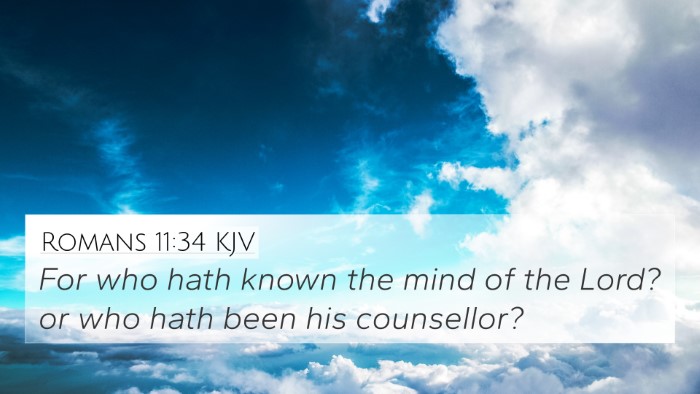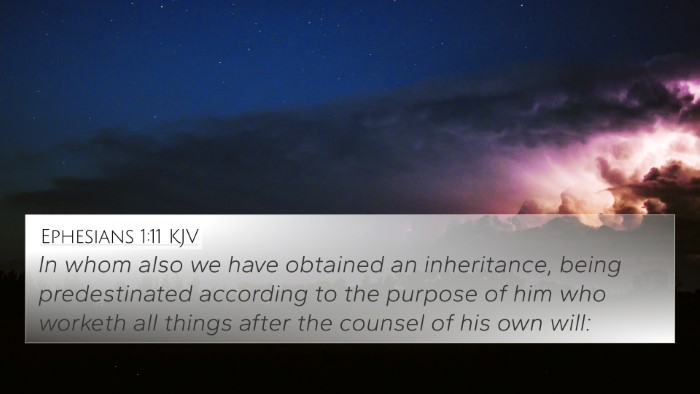Understanding Isaiah 40:13
Isaiah 40:13 states, "Who hath directed the Spirit of the Lord, or being his counsellor hath taught him?"
This verse emphasizes the unmatched wisdom and sovereignty of God over creation and the futility of attempting to advise or guide Him.
Summary of Insights from Public Domain Commentaries
Matthew Henry's Commentary
Matthew Henry elucidates that this verse poses a rhetorical question, indicating that no one can claim to have guided God’s Spirit or provided counsel to Him. It highlights human limitations in understanding God's plans and purposes. The passage serves as a reminder of God's infinite wisdom, contrasting it with human ignorance. Henry argues that true knowledge and wisdom emanate only from God, and attempts to instruct Him are both futile and presumptuous.
Albert Barnes' Notes
Albert Barnes emphasizes that God is incomprehensible and beyond human guidance. He explains that the Spirit of the Lord is unique, implying that no one can match God's knowledge or direct His actions. Barnes points out that the idea of instructing God showcases the arrogance of humanity, which often overestimates its wisdom when approaching divine matters. This verse calls upon believers to acknowledge their own limitations and the perfect nature of divine wisdom.
Adam Clarke's Commentary
Adam Clarke remarks that this verse enforces the idea that God's Spirit governs the universe perfectly. He suggests that the reference to directing God's Spirit signifies that God’s decisions are unchallengeable. Clarke elaborates that the assertion reflects God's unparalleled authority and the solemn reality that mankind lacks the capability to influence divine decisions or counsel the Almighty. He encourages humility among believers when considering their relationship with God.
Key Themes and Cross-References
Isaiah 40:13 can be better understood through various cross-references that highlight the nature of God’s wisdom and the limitations of human understanding. Here are some verses that interact with this theme:
- Romans 11:34: "For who hath known the mind of the Lord? or who hath been his counsellor?"
- Job 15:8: "Hast thou heard the secret of God? And dost thou restrain wisdom to thyself?"
- Psalms 94:11: "The Lord knoweth the thoughts of man, that they are vanity."
- Isaiah 55:8-9: "For my thoughts are not your thoughts, neither are your ways my ways, saith the Lord."
- Proverbs 21:30: "There is no wisdom nor understanding nor counsel against the Lord."
- 1 Corinthians 2:16: "For who hath known the mind of the Lord, that he may instruct him? But we have the mind of Christ."
- Job 38:2-3: "Who is this that darkeneth counsel by words without knowledge? Gird up now thy loins like a man; for I will demand of thee, and answer thou me."
Thematic Connections
The thematic connections of Isaiah 40:13 resonate with broader Biblical teachings concerning the sovereignty of God and the nature of divine counsel. This verse sheds light on critical aspects, such as:
- God's Sovereignty: The verse underscores God's ultimate authority and His independence from human counsel.
- Human Limitations: It reflects the understanding that human wisdom is limited and often flawed in comparison to divine wisdom.
- Humility Before God: Believers are encouraged to approach God with humility, acknowledging His perfect understanding.
Conclusion
Isaiah 40:13 invites readers to marvel at the incomprehensibility of God’s wisdom and to recognize their position in relation to divine authority. In exploring this verse through the lenses of commentaries by Matthew Henry, Albert Barnes, and Adam Clarke, one gains insight into the profound message that God does not need human counsel, and in fact, humanity should seek to learn from Him rather than attempt to teach Him. By linking this context with other scriptural references, believers can deepen their understanding of the intricate relationship between God's sovereignty and human limitation.









